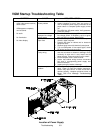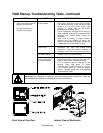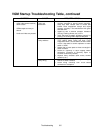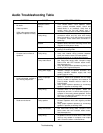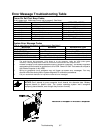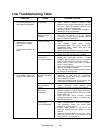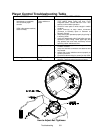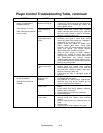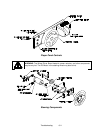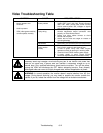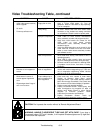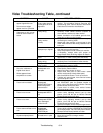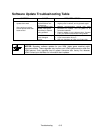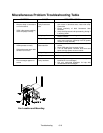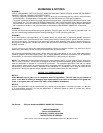
Troubleshooting 6-13
Video Troubleshooting Table, continued
SYMPTOM CAUSE REQUIRED ACTION
Floppy disk in drive
Check floppy drive for diskette. If you find disk,
eject it. Leave VGM power on. Turn off
computer. Wait for hard disk to stop spinning.
Turn on computer.
Faulty wiring
Loosen computer case lid thumbscrews and lift
off cover. Assure that hard drive ribbon cable
connector is fully seated into mating connector
on motherboard. Check hard drive power cable.
Improper components
1. Verify that hard disk drive is correct for this
VGM. Label on drive records manufacturer
name, assembly number and program version.
2. Verify that circuit boards are correct for this
VGM. Label on each board records
manufacturer name, assembly number and
hardware version.
3. Verify that ROM instruction set is correct for this
VGM. VGM set includes more than one ROM.
Label on each ROM records assembly number
and software version.
•
VGM (video game machine)
doesn’t appear
•
No audio
•
Power-up self-test runs
Hard drive problems
1. Turn computer on. Immediately look under hard
drive. Hard Drive Activity LED flashes if drive is
operating properly.
2. Allow VGM to load normally. Note and record
any error messages that occur during self-test.
3. Remove hard drive and install it in working VGM.
If symptom recurs there, hard drive is faulty.
Replace it.
•
Blotches of color appear on
screen
Picture tube aperture
mask is magnetized
Remove diskettes from room. Demagnetize
monitor with external degaussing coil. Take care
not to magnetize neighboring VGMs. Monitor
may be on or off for this procedure.
•
White areas in center of
screen appear tinged with
color
•
Object edges have fringe of
one or more colors
Picture tube purity or
static convergence is
out of alignment
1. Turn on VGM.
2. Press and hold TEST MODE to enter Menu
System. At Operator (Main) Menu, select
Diagnostic Menu. Then select Monitor Patterns
Menu. Run through Crosshatch, Red, Green and
Blue screens to find clearest display of problem.
3. Display screen with greatest problem.
4. Display Crosshatch Screen. Locate purity and
static convergence ring magnets on back of
monitor neck. Watch screen in mirror. Adjust
magnets to minimize problem. Follow
instructions from monitor manufacturer.
5. Display Crosshatch Screen. Touch up
adjustments while watching screen in mirror.
CAUTION:
Don’t operate the monitor without its Remote Adjustment Board.
WARNING: HANDLE FLUORESCENT TUBE AND CRT WITH CARE.
If you drop a
fluorescent tube or CRT and it breaks, it will implode! Shattered glass can fly eight feet
or more from the implosion.



